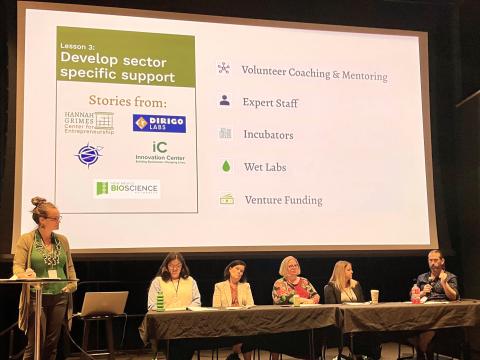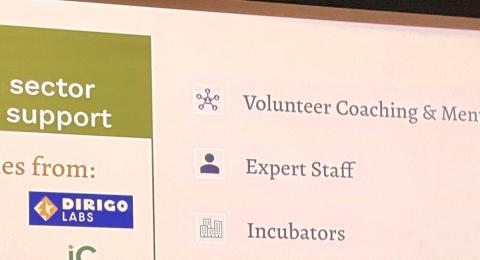Radically Rural: Sparking Solutions Together
If you didn’t make this year’s Radically Rural Summit, hosted by the Hanna Grimes Center for Entrepreneurship, you missed out on some of the most innovative ideas and solutions to key challenges facing rural America today, from job creation to tackling climate change. Radically Rural (RR) began in 2018 as a grassroots movement to empower the collective voice of rural places and connect people with each other and to new ideas. This year’s Radically Rural Summit in Keene, New Hampshire brought together rural leaders and practitioners from around the country to connect, share, and set an agenda for crafting a vibrant rural future.

Panel of rural entrepreneurship organizational leaders.
The opening Keynote, Regenerating Rural by Reweaving Our Frayed Social Fabric, featured three compelling network weavers who spoke to the importance of building a strong, inclusive social fabric in communities to unleash the collective power to solve community challenges. Megan Helberg spoke of a program she launched in rural Nebraska to connect school students and community members through travel. Fatuma Emmad, a faculty member at the University of Colorado, Boulder and Co-founder/Executive Director of Frontline Farming (she prefers to be referred to as simply a farmer), spoke about a farmer advocacy group led by women and People of Color that advocates for fair wages, living and working conditions, and connects growers to markets. And LB Prevette, an LGBTQ advocate, shared her experience creating an inclusive bar in the heart of Appalachia and serves as a safe space where diverse community residents gather.
Perhaps my favorite session was Can You Create a New Economic Sector?: Lessons Learned from Trying. This session featured leaders from five biotech support organizations who came together a year ago as “Radically Rural – Biotech (RRb)” to form a community of practice that harnesses collective rural resources, networks, and knowledge to grow biotech in rural places. The session highlighted the lessons they are learning about what it takes to create our own version of density when we don’t have the luxury of condensed geographic proximity, and begged the question, “Can this model be used to raise up other new sectors in rural and remote places?” Below are some key takeaways for organizations that support entrepreneurial growth, particularly in the biotech sector.
- Leverage Rural Advantages: Many consider biotech a predominantly urban sector, but rural places have many assets that can support thriving biotech industries, including retired biotech workers, rural institutions like national labs, less competition, a deep sense of place, and a high quality of life.
- Commit to the Long-Term: To see meaningful growth in a technology-driven sector, one has to be in it for the long haul. It can take decades to cultivate a thriving biotech sector.
- Foster an Entrepreneurial Ecosystem: It takes a village of ecosystem supports to grow biotech, including technical support, institutional collaboration, political support, and startup capital from Angel investors and lenders.
- Build a System of Navigators: The key to successful biotech startups is navigation: guiding biotech entrepreneurs through the resource landscape, regulations, export controls, government, partner landscape, and supply chain resources.
- Engage your Regional and Federal Partners: Work with agencies and organizations like the US Department of Agriculture and Economic Development Corporations, and state economic development agencies. And make sure biotech is a key component in your region’s Comprehensive Economic Development Strategy (CEDS), which helps ensure regional buy-in and increases the likelihood of garnering resources from the Economic Development Administration (EDA).
These were just a few key lessons gleaned from the panel of speakers representing biotech support organizations. If you are working to grow biotech in your region, there is great value in reaching out to those who may be a little further ahead in the pursuit. RRb is still accepting new partners and even if you aren’t a fit as a partner, they are happy to share their journey with you.
To learn more about Radically Rural, go to: https://radicallyrural.org/
